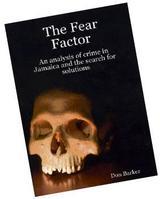
THE FEAR Factor: An Analysis of Crime in Jamaica and the Search For Solutions is written in earnest and with the best of intentions. However, while being earnest and well intended are admirable, they do not a good book make.
And it does not help that the author of the slim volume, Don Barker, sometimes goes for the melodramatic in stating the obvious ("just because there is a police station on the corner does not make that corner safe!").
In addition, he litters the text with unsubstantiated statements, even when he obviously would have access to the information ("in a previous thesis for one of my courses, my research uncovered that trade unions in Jamaica treat their own workers worse than comparable sectors in the private or government sectors!").
Furthermore, we do not know much about the author other than what he says in the introduction, that "this is a book by an ordinary Jamaican in self-imposed exile abroad" (he went to Canada in 1992).
HEAVY-HANDED STUFF
It is in this introduction that he claims, for the expected general election, "one awaits with bated breath the military being unleashed on the JLP". Heavy-handed stuff indeed.
The Fear Factor is separated into four chapters, the first dedicated to why the police, trade unions and politicians all suck (not sexually, although the section on the unions is subtitled 'mine is bigger than yours'). The second is entitled 'Crime Cause vs Effect', and the third chapter is 'Solutions At Last!', with 13 suggestions. The final two pages are very optimistically named a chapter and labelled 'Conclusion'.
From pointing to a political root for gangs to the euphemistic naming of 'area leaders', Barker says nothing startlingly new and he does not put a new twist on the old.
His proposed solutions cover debt repayment, revamping of the police force and army (as well as cross-training firemen to perform security roles, maybe complete with .38 pistols), education, revamping the approach to punishment for drugs ("persons using drugs in a public
place or who commit anti-social acts while on drugs would be dealt with more severely than if they used their drugs quietly") and decriminalising marijuana.
Where The Fear Factor does have value is his first-hand experience of living in an inner-city area, saying "prior to emigrating to Canada, I lived in one of the worst inner-city garrison communities off of Spanish Town Road in Kingston for about three years.
I moved to this community after growing up insulated in a middle-class area. Although I could have lived in other non-garrison [areas], I jumped at the chance as I knew that it would give me valuable insight into the psychology of residents of these communities."
RUDE AWAKENING
He gets not only that, but also the experience of being taxed, how the 'donship' system works and a very rude awakening in a pre-dawn police raid.
He also speaks of witnessing seemingly orchestrated violence in 1980, in the run-up to that year's general election, and he would have been better served to have written a book about these personal experiences rather than this clumsy attempt at tackling the big picture.
One thing is clear, though, is that he listens to talk shows and reads the newspapers a lot.
The Fear Factor: An Analysis of Crime in Jamaica and the Search For Solutions is published by Educational and Technological Consultants (EDUTEC), for which U.S. and Canada addresses are given.
'The Fear Factor: An Analysis of Crime in Jamaica and the Search For Solutions'
Author: Don Baker
Reviewer: Mel Cooke
Publisher: Educational and Technological Consultants

